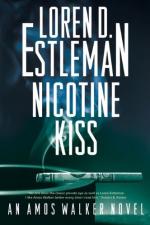|
This section contains 458 words (approx. 2 pages at 300 words per page) |

|
In its pure state, nicotine is a colorless, oily, acrid liquid. It has the chemical formula C10H14N2, and the systematic name 3-(1-methyl-2 pyrrolidyl) pyridine. It is toxic and it turns yellowish brown in air and light. Nicotine has a boiling point of 476°F (247°C). Nicotine is the principal alkaloid in tobacco (Nicotiana tabacum). While the tobacco plant is indigeous to North America, it is now commercially cultivated and naturalized in most sub tropical countries. The word "nicotine" comes from J. Nicot, the man who introduced tobacco to France in the sixteenth century.
Nicotine is present in cigarettes, cigars, pipes, chewing tobacco, and snuff. A stimulant, nicotine increases the pulse rate and blood pressure of the smoker. The initial side effects of nicotine are dizziness and nausea, but nicotine is also highly addictive. Users claim that nicotine aids in relaxation and helps combat anxiety...
|
This section contains 458 words (approx. 2 pages at 300 words per page) |

|


